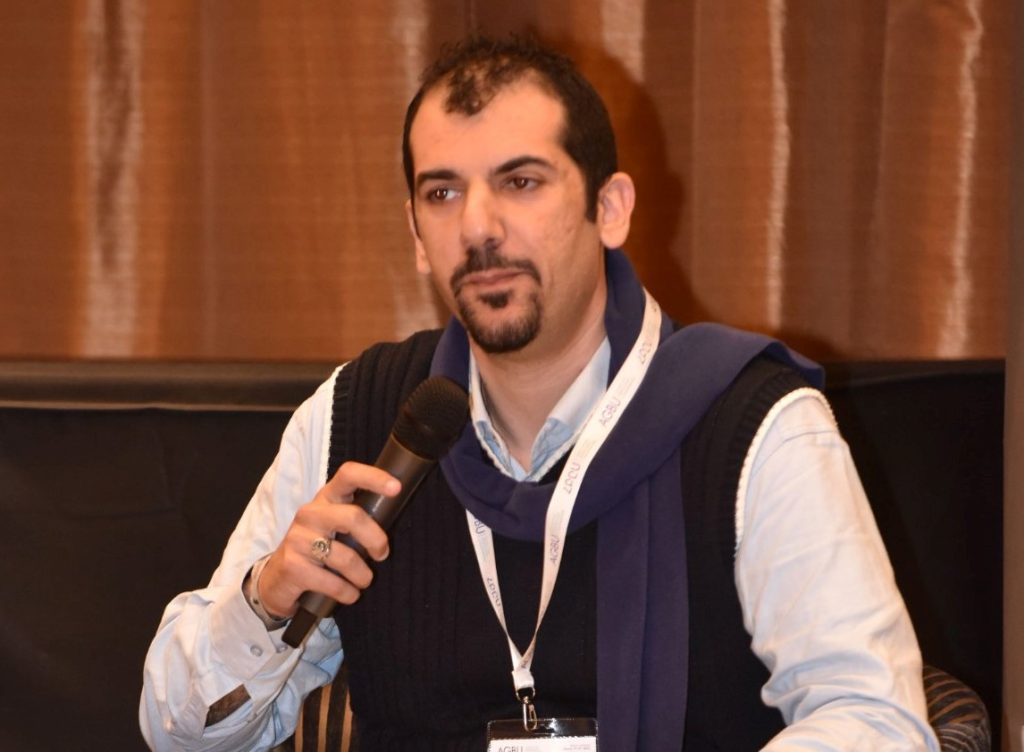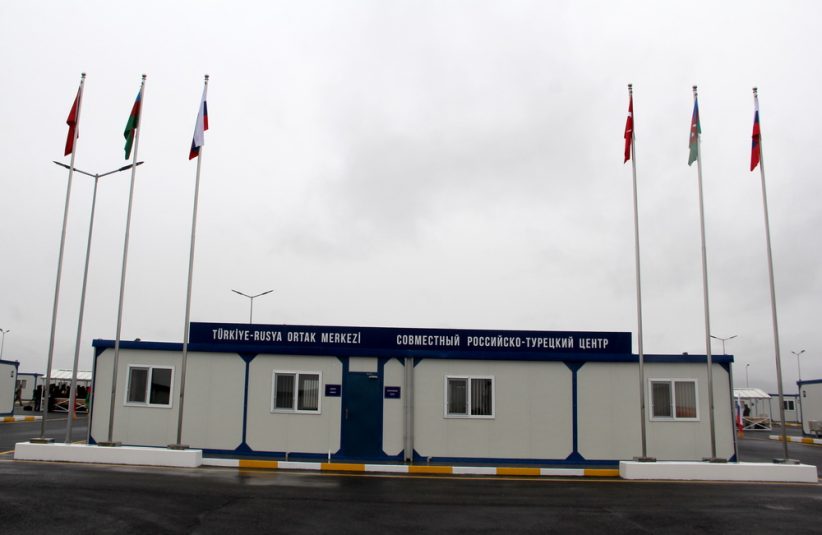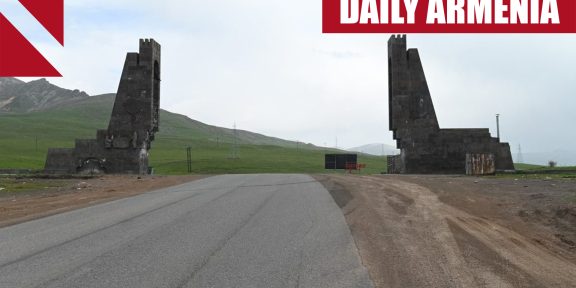Below are excerpts from the article “The Russian-Turkish “Co-opetition” in Times of Regional Crisis” by regional analyst and researcher Yeghia Tashjian. The original piece was published by Issam Fares Institute for Public Policy and International Affairs at American University of Beirut.
[…]
Nagorno-Karabakh: A Confrontation in Russia’s Backyard
While both countries “understand” each other over Libya and Syria, Turkey’s aspiration to play a greater role in the South Caucasus puts this relationship to the test. With the outbreak of the second Nagorno-Karabakh war (September 27 – November 9, 2020), Turkey saw a historical opportunity to exert its influence in its immediate neighborhood—the South Caucasus. Unlike Syria and Libya, this region has been Russia’s backyard and within Moscow’s sphere of influence. To challenge Russia, Turkey threw its full active military and diplomatic support behind Azerbaijan in its war against the Armenians in Nagorno-Karabakh.
Turkey’s direct military support in the war caught the surprise of many parties. Turkey not only used its Bayraktar TB2 drones, but also the F-16 warplanes stationed in Ganja and transferred hundreds of Syrian mercenaries to fight alongside the Azerbaijani army. These two factors were a threat to Russia’s national security in the region. To preserve its interests in the Caucasus, Moscow tried to stick to its traditional stance of a “fair and forceful arbiter,” but this neutrality prevented Armenia, Russia’s only ally in the region, to resist the Azerbaijani invasion of Nagorno-Karabakh.
On a diplomatic level, Turkey tried to launch an “Astana style” diplomatic track to gain primacy on the OSCE Minsk Group; whose task was to find a diplomatic solution for the conflict. Ankara’s initiative was welcomed by its ally Azerbaijan who noted the failure of the traditional diplomatic track processed by the OSCE. However, given the fact that the conflict was taking place in post-Soviet space, Russia was not very encouraged to engage in a bilateral track with Turkey in the form of a new “Astana style” process where Turkey and Russia were going to be equal partners arranging a conflict in Russia’s backyard. An “Astana style” scenario would have legitimized Turkey’s intervention and presence in the region. Hence, Moscow preferred to play the “big brother” role and forced a ceasefire on both sides.
Maxim Suchkov, a Moscow-based expert in the Russian International Affairs Council (RIAC), explained Russia’s policy as follows: If Russia took a backseat while Azerbaijan continued advancing, Turkey’s gambit would pay off as Baku would be forever grateful for Ankara, and Turkey’s influence in the region would grow. Moreover, if Baku took control over Stepanakert (capital of Nagorno-Karabakh) and the entire region was annexed to Azerbaijan, Armenians would have blamed their failure on Russia and anti-Russian sentiments would have risen in Yerevan. By losing its only ally, Russia would have lost the region.
However, what would have happened if Moscow had directly intervened? Galip Dalay, an associate fellow from Chatham House, argued that if Russia had stepped in and supported its ally, then it would have risked alienating Azerbaijan and pushing Baku further into Turkish hands. For Moscow, the best-case scenario was a limited victory for Azerbaijan, once again freezing the conflict to have leverage on both Yerevan and Baku. But Turkey’s efforts to unfreeze the conflict and tarnish the status-quo pushed Russia on the defensive and secured its interests at the expense of the Armenians who were the weaker side. For Dalay, this conflict put Turkish-Russian relations to the test and placed Russia in an uncomfortable position. For Turkey, this was not a complete victory, as Ankara was pushing for complete Azerbaijani victory, forcing Russia out of the region by instigating enmity between Yerevan and Moscow, or at least asking for the deployment of Turkish “peacekeepers” in Nagorno-Karabakh alongside Russian forces. It is worth mentioning that Turkey has not been a signatory to the November 9, 2020, trilateral statement which ended the war. As it was clear that Turkey’s direct military support for Azerbaijan and its insistence that Turkish troops be part of the peacekeeping force in Nagorno-Karabakh certainly challenged Kremlin’s position in the region. Hence, Moscow rejected the Turkish proposal of deploying Turkish peacekeepers alongside the Russians and agreed only to deploy Turkish observers in a peacekeeping force headquarters in a region outside but close to Nagorno-Karabakh.
During the war, both Moscow and Ankara played tit-for-tat against each other. Many observers didn’t notice that while Russia was defensive in its backyard, it was inoffensive in Syria and the Russian air force was bombing Turkish positions in Idlib. By putting pressure on Ankara through Syria, Russia was trying to balance its vulnerabilities with Turkey. Turkey too had another plan in the South Caucasus where in November 2020, the Trans-Adriatic Pipeline (TAP) was inaugurated and connected to the Trans-Anatolian Pipeline (TANAP), which allowed for bringing the Caspian gas to South Europe through Turkey.29 This project is crucial for Turkey as it transforms the country from an importer to a transit route for gas. The geopolitical nature of this project was to decrease Europe’s gas dependency on Moscow. However, as Azerbaijan expressed its readiness to increase its gas supplies to Europe through this pipeline, President Putin just two days before the outbreak of the war in Ukraine, invited his Azerbaijani counterpart, Ilham Aliyev to Moscow to coordinate Baku’s gas supplies to Europe and signed an “alliance agreement” between both countries. Hence, even though Russia has shown dissatisfaction with Turkish intervention in its area of the traditional sphere of influence and drew “red lines,” Russia has recognized Turkey as a junior player in the region, but it doesn’t tend to share parity in the post-conflict regional order.
Thus, the relationship between both countries in the South Caucasus has been hierarchical. Both sides succeeded in sidelining the Western influence from the diplomatic process in the region, especially the Americans and French (co-chairs of the OSCE Minsk Group alongside Russia). Within this context, it is worth mentioning that Turkey’s growing influence in the South Caucasus didn’t come only at the expense of the West, but also at the cost of Russia’s influence as well. This is why Russia resisted any further diplomatic attempts by Turkey. Turkey, unhappy with the diplomatic outcome and its modest role as an ordinary member of OSCE, initiated the “3+3 regional security platform” in the Caucasus. This security format in the Caucasus comprises the three Caucasian states – Armenia, Azerbaijan, and Georgia – and their three “big neighbors” – Russia, Turkey, and Iran. For now, Russia is pushing this format as it sidelines the West. Hence, the future of Turkish-Russian relations in the South Caucasus is shaped by current relations between Russia and the West. The tenser these relations, the more Moscow will need Ankara to contain the western influence. This process is making Turkey a regional power but also increasing its dependency on Russia.
[…]
Assessment: The limits of Russian-Turkish “Co-opetition”
- Despite the growing areas of cooperation and “conflict management” between the two states, whenever a disagreement emerged, Moscow has been able to secure its interests and push Turkey slowly back. Unlike many who believe that Moscow and Ankara have “brotherly relations,” these relations are characterized by mistrust and geopolitical rivalries. What makes this relationship unique is that both sides have tried to minimize the Western influence. The biggest challenge for their “co-opetitative” relationship will be the war in Ukraine and the impact of its outcome on the region.
- Is there a strategic alliance between them? Moscow does not view Turkey as a “strategic ally” but, as Foreign Minister Sergey Lavrov said “a very close partner”. Meanwhile, Russia regards alliances as an attribute of great power. Russia’s alliances are asymmetric in nature and provide Russia with a bigger regional role where Moscow can speak on behalf of its allies (such as the CSTO). For this reason, Russia does not engage in formal alliances with rising international and regional powers such as China, Iran, and Turkey. On the other hand, Turkey—a NATO member—relies on its security guarantees and cannot abandon its duties and obligations as it would risk exposing its vulnerabilities and becoming marginalized. Turkey’s membership in NATO gives it important room to maneuver in its relations with Russia.
- The divergence of interests between Turkey and its NATO allies is crucial to Russia; this is why Moscow praises Ankara’s independent foreign policy. Moscow views Turkey’s autonomy from NATO as a positive development. However, Turkey has another perspective, as it believes that by cooperating with Russia on various issues, its standing in NATO will increase as it will be the only NATO member to deal with Moscow and keep the Russian influence in check throughout NATO’s eastern and southern neighborhoods. Furthermore, NATO needs Turkey to contain the Russian influence in the Eastern Mediterranean and Ukraine. For NATO, Turkey is the only backchannel left to engage with Russia in many regional conflicts, including the crisis in Ukraine. Moreover, Russia’s growing influence in the Eastern Mediterranean is reducing Turkey’s strategic autonomy and room for maneuver there. Turkey will inevitably be disturbed by Russia’s strong military presence in its neighborhood; Turkey feels surrounded militarily by Russia from three different directions; north (Crimea), east (Armenia), and south (Syria).
- In Libya, both countries are guided by geo-economic, primarily energy security, motives. One of the thorniest issues facing Libya’s interim government is the agreed October 2020 deadline for foreign forces (Russian and Turkish forces and their mercenaries) to withdraw from the country. It is unclear how the withdrawal will take place, and in what conditions. However, the Turkish President has made his intentions clear that he will not pull his troops out until others do so first. With the success of the political track, differences between the two countries are unlikely to escalate into a larger conflict again but the outcome of the Libyan Presidential elections is still a cause for concern in Moscow.
- If thanks to Russia, Turkey was now able to contain the Kurdish autonomy aspirations in North-Eastern Syria, the greatest advantage for Russia in cooperating with Turkey was the establishment of the Astana Process. This was seen as a major diplomatic victory for Russia towards the Syrian crisis. Turkey’s involvement was important to provide legitimacy for the negotiations as a great deal is at stake for Russia in the Astana Process to boost its image and credibility as a regional conflict manager. If the cooperation over Syria fails, then the alternative is direct confrontation and the increase of Western influence in Syria. Something that would jeopardize Russia’s interests in the Levant.
- The Russian broken ceasefire and the November 9, 2020, trilateral statement over Nagorno-Karabakh and the developments that proceeded will not diminish the Turkish influence in South Caucasus. Turkey and Azerbaijan have established military alliance and energy interdependency which are going to receive a further boost from the opening of the rail connection between Nakhichevan and Baku, as stipulated by the trilateral statement and secured by instant investment. The possible opening of the border from the Turkish side in front of Armenia, may not be a positive development for Moscow. After the war, Ankara and Moscow are translating their economic power to invest in railways, roads, and other infrastructural developments in the region. Turkey, together with Azerbaijan are pushing the “West-East” trade route known as “Zangezour Corridor” passing through Southern Armenia, bypassing Iran and Russia and connecting Turkey directly to Azerbaijan and Central Asia, thus further expanding Turkey’s influence in the region. The fact that Russia’s dominance over the South Caucasus is being challenged– not by NATO enlargement policy, but by Turkish interference – is hard to consume for Moscow, where many mainstream experts keep arguing about Erdogan’s arrogance and Turkey’s expansion in the Caucasus and Central Asia at the expense of Russia’s influence. However, this argument turned out to be wrong, as Russian-led CSTO “peacekeeping” forces quickly intervened and resolved the crisis in Kazakhstan (January 2-11, 2022) in a matter of days.
- Energy security is a crucial component of Russian-Turkish relations. Turkey is energy-dependent through the extended gas imports from Russia, and Russia is dependent on Turkey for its geopolitical position, which makes Turkey an energy transit hub. Turkey also is the second most valuable market for Russian gas after Germany and Gazprom aims for further expansions even by connecting the Levantine gas fields to pipelines passing through Turkey. However, Ankara is playing on two strings, on the one hand allowing Russian pipelines to pass from its territories and increasing its leverage over Europe, and on the other hand, seeking to expand Azerbaijan’s share in its gas market and decrease its energy dependency from Moscow. This factor will have a crucial impact on the geopolitical nature of the future of Russian-Turkish relations.
- The Ukrainian crisis may be the biggest challenge in testing the waters between President Erdogan and Putin. Erdogan will continue sitting on the fence for a while. Over the past years, both Presidents Erdogan and Putin invested politically and economically to consolidate and raise their bilateral relations to a new level. As highlighted in this paper, Turkey is dependent in many ways on Russia. Hence, President Erdogan will aim to continue cooperation with Russia in the region; but he would also step up engagement with NATO to improve his global standing and reduce international criticism on his domestic conduct. Erdogan knows that standing against Russia and directly confronting Moscow is very risky as, excluding the ongoing war in Ukraine, he would open a three-front war in the region: In Libya, Syria, and Nagorno-Karabakh. Hence, Turkey would continue supplying Bayraktar TB2 drones to Ukraine but would not cross the “red lines” and directly challenge Russia. For this reason, President Erdogan cannot antagonize Russia and risk full-scale war since domestically, the implications of this war will be heavy on the Turkish government.
- If the war in Ukraine is prolonged, Moscow may need Ankara to arrange a temporary settlement in Ukraine. Will the Syrian and Nagorno-Karabakh scenario be repeated where both sides sidelined the Western influence and Russia accepted a Turkish role in the region? If Ukraine is divided into two zones, will Russia accept a Turkish “peacekeeping force” in the Western part of Ukraine? Will the Americans give a “green light” for Turkey to enter in such a game? What will Turkey gain in return? Is such military adventure within Turkey’s capabilities? Coming up with such scenarios some would think will be unrealistic for the time being, but developments on the ground may tell us to what extent “co-opetition” between both countries may also extend towards Ukraine.
- Finally, any sudden change in political leadership in either country might disrupt this balance and allow their competing geopolitical ambitions to clash with each other. Western media and some intelligence sources claim that if the outcome of the military operation in Ukraine may not favor Russia, President Putin’s leadership will be challenged, and the new leader may be harsher than Putin. There are also Russian concerns that in 2023, President Erdogan and AKP may lose grip over power and the new administration may shift its policy toward the West to challenge Russia’s influence. Moscow has fears that any change of leadership in Turkey would shift the regional status quo and interrupt Russia’s policies in the MENAC region. Thus, the current “co-opetition” between both countries is very much dependent on the personal relations of both leaders.
About the author

Yeghia Tashjian is a regional analyst and researcher. He has graduated from the American University of Beirut in Public Policy and International Affairs. He pursued his BA at Haigazian University in Political Science in 2013. He founded the New Eastern Politics forum/blog in 2010. He was a Research Assistant at the Armenian Diaspora Research Center at Haigazian University. Currently, he is the Regional Officer of Women in War, a gender-based think tank. He has participated in international conferences in Frankfurt, Vienna, Uppsala, New Delhi, Rome, and Yerevan, and presented various topics from minority rights to regional security issues. His thesis topic was on China’s geopolitical and energy security interests in Iran and the Persian Gulf. He is a contributor to the various local and regional newspapers, columnist for the Armenian Weekly, and presenter of the “Turkey Today” program in Radio Voice of Van. Lately, he has joined the European Geopolitical Forum as an affiliate expert on the Middle East and South Caucasus.
















